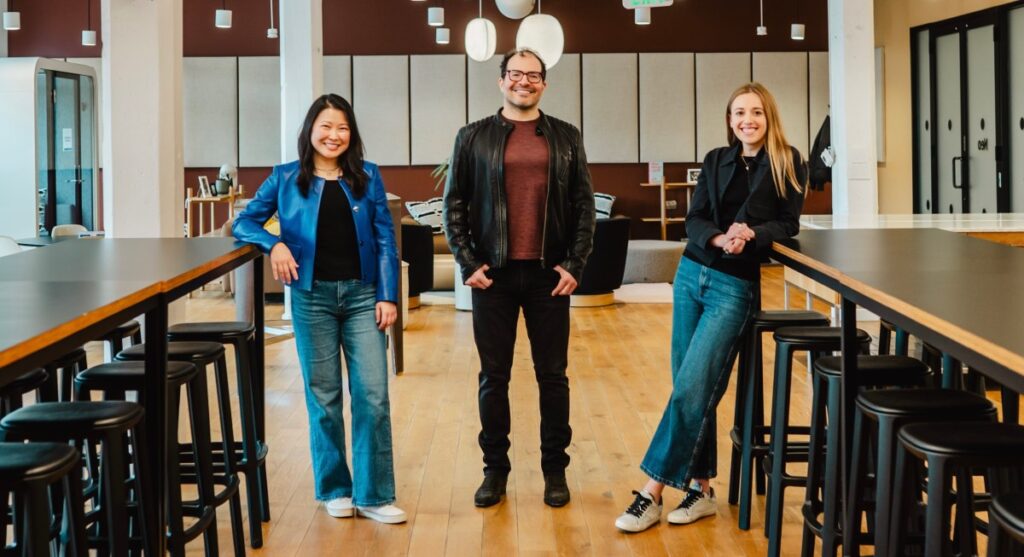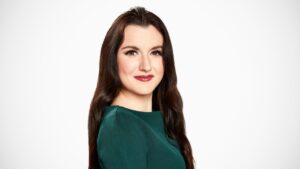
<strong>Image Credits:</strong>Neo
Ali Partovi’s Neo Venture Firm: From Coding Tests to Billion-Dollar Startups
Ali Partovi’s Neo venture firm has quietly revolutionized how Silicon Valley identifies and nurtures exceptional talent. While founders like Elon Musk and Mark Zuckerberg dominate tech headlines, Partovi has built an eight-year experiment that’s now generating remarkable returns by focusing on one unconventional approach: administering coding tests to identify future tech superstars.
Table of Contents
Ali Partovi (center) with Neo partners Suzanne Xie and Emily Cohen. Image Credits: Neo
The Background of Ali Partovi’s Neo Venture Firm
The story of Ali Partovi’s Neo venture firm begins with Partovi’s own impressive entrepreneurial journey. The Iranian-born Harvard graduate built an impressive resume early in his career, joining LinkExchange (acquired by Microsoft for $265 million in 1998) and co-founding iLike (sold to MySpace for approximately $20 million in 2009). Together with his twin brother Hadi, Ali also launched the educational nonprofit Code.org and became an early investor in tech giants including Facebook, Airbnb, and Dropbox.
While industry insiders have long recognized the Partovi brothers as savvy investors, Ali Partovi’s Neo venture firm, founded eight years ago, represents his most ambitious experiment yet. The firm promised from its inception to revolutionize how exceptional talent is discovered in the tech industry—and is now delivering compelling results that validate this approach.
Neo’s Unconventional Talent-First Approach
Unlike traditional venture capital firms that bet on established teams or market trends, Ali Partovi’s Neo venture firm employs a fundamentally different approach. Partovi focuses on identifying exceptional individuals, often while they’re still in college, and nurturing their potential through mentorship before they’ve even incorporated a company.
This talent-first philosophy represents a paradigm shift in venture capital. “This year, for the first time, I can conclusively say that we are discovering the future superstars before anyone else,” Partovi, known for being equal parts gracious and tenacious, told an editor on Friday.
The Neo Difference
While many VC firms claim to be “founder-friendly,” Ali Partovi’s Neo venture firm takes this concept further by identifying talented individuals before they become founders and helping shape their entrepreneurial journey from the earliest stages.
Success Stories from Neo’s Portfolio
Ali Partovi’s Neo venture firm has an increasingly impressive portfolio that validates its talent-spotting approach. Among its notable investments:
- Anysphere – Maker of the popular AI-powered coding editor Cursor, now approaching a $10 billion valuation
- Bluesky – The decentralized social network was Neo’s first institutional investment outside Twitter and was recently valued at $700 million
- Kalshi – An online prediction market whose popularity surged during the 2024 U.S. presidential election
- Cognition – A coding assistant company recently valued at $4 billion
- Pika Labs – Creator of text-to-video Generative AI tools, currently valued at $700 million
- Chai Discovery – Raised $30 million from OpenAI and Thrive Capital for molecular structure prediction models
The relationship between Ali Partovi’s Neo venture firm and Michael Truell exemplifies this approach. In 2017, Truell, then a freshman at MIT interning at Google, met with Partovi. During that hour-long meeting, Partovi gave Truell a coding test that he completed in just 15 minutes—the beginning of a relationship that would prove lucrative for both. Years later, backed initially by Partovi, Truell co-founded Anysphere, which may become one of Neo’s most successful investments.
How Neo Identifies Technical Talent
When evaluating potential superstars, Ali Partovi’s Neo venture firm focuses on three key qualities:
| Quality | Importance | How It’s Evaluated |
|---|---|---|
| Technical ability | Critical foundation | Coding tests and technical interviews |
| Entrepreneurial inclination | Signals risk-taking propensity | Past entrepreneurial experiences |
| Challenging status quo | Indicates innovation potential | Conversations about fundamental assumptions |
| Magnetism | Perhaps most crucial | “If they started something, would their smartest friends join?” |
Partovi explained that technical ability matters not because founders will code all day, but because “computer science really helps. It just helps you think.” He cites examples like Jeff Bezos, Reed Hastings, and Larry Ellison—all computer science students who became legendary business leaders.
The Magnetism Factor
According to Partovi, the fourth quality—magnetism—may be the most crucial. He evaluates this by asking: “If this individual started something, how likely would their smartest friends be to join them?” This was particularly evident in Truell, whose “quiet confidence” convinced Partovi that “his smartest MIT friends would consider joining him.”
Neo Scholars and Accelerator Programs
Ali Partovi’s Neo venture firm operates two main programs to identify and support exceptional talent:
- Neo Scholars Program – Provides a $20,000 grant to college students to take a gap semester, with no equity required. Thirty students are chosen yearly.
- Neo Accelerator – A more traditional program that offers funding and guidance to 20 early-stage companies each year, established in 2022.
Partovi and his partners at Neo, Suzanne Xie and Emily Cohen, personally manage these programs. “I try to coax them towards taking a bit more risk, going outside their comfort zone, aiming higher than whatever they are aiming for right now,” Partovi explained about his mentorship approach.
The success of these programs is evident in the fact that “last year, every one of OpenAI’s new grad hires was a Neo scholar,” as Partovi proudly noted.
Neo’s Investment Returns and New Funding
As Ali Partovi’s Neo venture firm reputation has grown, so has competition to get in. Applications to both Neo programs have doubled annually, according to Partovi. However, unlike many venture firms that would expand to accommodate demand, Neo has made a deliberate choice to maintain selectivity over scale.
This philosophy extends to fund size as well. While many VCs raise ever-larger funds when they can, Neo recently closed on $320 million in fresh capital—only slightly more than the $235 million it collected in 2023. Notably, Partovi’s personal stake in the newest fund increased significantly, with him investing more of his own money into this fund than all three previous Neo funds combined.
Neo’s Early Fund Performance
While Partovi is cautious about discussing unrealized returns, Neo’s early funds are performing exceptionally well:
- The first fund is already between three and four times its value, with “potential room for it to double or triple again”
- The second fund has more than doubled from the Anysphere investment alone
Neo’s prominent backers include Sheryl Sandberg, Bill Gates, and Reid Hoffman, who wrote one of the first checks to the firm back in 2017—a testament to the confidence industry leaders have in Partovi’s vision.
Investment Philosophy: Value Over Exits
Despite the current chilly exit market, Ali Partovi’s Neo venture firm advises founders to focus on building enduring value rather than quick exits. “I [tell] people not to obsess about making money and obsess more about serving other humans,” Partovi said. “Build a product that’s so wonderful that other people just love it. Money is the result, not the goal.”
This long-term perspective aligns with Neo’s patient approach to talent development and investment. Rather than chasing quick returns, Ali Partovi’s Neo venture firm is building a sustainable model for identifying and nurturing the next generation of tech innovators.
As the tech industry continues to evolve, Ali Partovi’s Neo venture firm stands as a powerful example of how rethinking fundamental assumptions about talent identification can yield extraordinary results. By focusing on exceptional individuals rather than market trends or established teams, Neo is creating a new playbook for venture capital—one coding test at a time.





